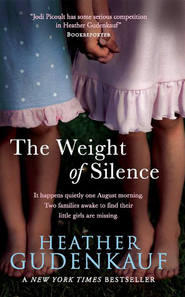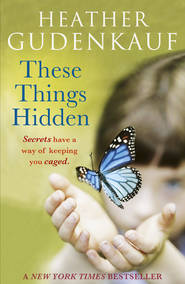По всем вопросам обращайтесь на: info@litportal.ru
(©) 2003-2025.
✖
Little Mercies
Автор
Год написания книги
2018
Настройки чтения
Размер шрифта
Высота строк
Поля
A weary waitress with a white ponytail and freckles dotting her nose approached, looking past Jenny’s shoulder toward the front entrance as if expecting an accompanying adult would step forward. She was wearing standard Happy Pancake fare, a navy-blue skirt and a blue-and-yellow-checked blouse and a matching scarf tied at a jaunty angle around her neck. Black, thick crepe-soled shoes completed the outfit.
“I’m meeting my big sister here,” Jenny lied effortlessly.
“Will it just be the two of you?” the waitress asked, leading Jenny to the table nearest to the door.
“Can we sit in the back there?” Jenny asked, turning slightly so that the waitress could see her backpack hanging from her shoulders. “Homework,” she said by way of explanation. If the waitress thought that it was odd that a young girl had homework in the middle of July, she gave no indication. Maybe they had year-round school in this town; maybe the waitress thought that Jenny was some kind of genius student who took college classes.
“Summer school, eh?” the waitress asked, her voice tinged with sympathy. “That’s no fun.”
“No,” Jenny rushed to explain. “Gifted and talented. I skipped third grade.”
“Good for you,” the waitress said as she led Jenny to a large booth in the rear of the restaurant. “No one can ever take your education away from you. What are you reading?”
Jenny blinked, drawing a blank. She wasn’t much of a reader, though she loved it when her teachers read out loud to her or when her father took the time to read her a book from the small stack of picture books that she brought home each week from the school library.
The waitress was looking at her with interest, waiting for her tell her the name of the genius-level book she was currently reading. Jenny’s mind worked furiously trying to recall a title of a book, but all she could think of was Little Turtle’s First Day of School and she could hardly say that. “The Bible,” Jenny finally blurted out. “I go to a very religious school. I’ve already read half of it.”
The waitress looked duly impressed as she set a large, glossy menu on the table. “I’ll be back with some water for you. Can I get you anything else to drink?”
Jenny wriggled out of her backpack, slid into the high-backed booth and set the pack next to her on the midnight-blue faux leather seat. The smell of coffee made her think of her father.
She had come to love waking up to the pungent smell of her father’s morning coffee. This meant that he was trying, that he was functioning well enough to get out of bed, to face the day, to go to work. The two of them would stand together at the kitchen counter, each sipping the black, caustic liquid. At first Jenny had winced, sticking out her tongue, rolling her eyes back in her head and making a gagging sound in response to the bitter taste, causing her father to laugh. Eventually she grew accustomed to the acrid sensation on her tongue, reveling in the bloom of warmth that flooded her mouth and coated her throat and to the zing of caffeine that nudged her into wakefulness. But most of all she loved the quiet moments with her father, both of them bleary-eyed, crunching on burnt toast and sipping their coffee from mismatched mugs.
“Coffee,” Jenny said with confidence. The waitress stood there for a moment, pen poised over her order pad while Jenny busied herself with scanning the menu, trying not to blush beneath the waitress’s puzzled gaze and realized her mistake. A waitress would easily remember a ten-year-old who ordered a cup of coffee and read the Bible for summer school. “It’s for my sister,” Jenny explained. “She’ll be here any minute. I’ll have milk.” The waitress raised an eyebrow at Jenny, her green eyes unwavering. “Please,” Jenny added contritely.
Soon the waitress returned, set the glass of milk in front of Jenny and poured a stream of black coffee from a stainless steel carafe into a ceramic white mug that she situated on the place mat across from Jenny. “No sister yet?” the waitress asked, tucking a loose strand of white hair behind her ear.
“Nah,” Jenny said casually. “She’s always late. I’ll just go ahead and order.” At the waitress’s skeptical look Jenny dug into her backpack. “I’ve got money. See?” Jenny pulled a wad of cash from the manila envelope.
The waitress’s eyes widened. “That’s a lot of money, you better put that away,” she warned, glancing left and right to see if any unsavory types were lurking around. “What can I get you?” she asked as Jenny shoved the money back into the envelope.
Jenny tapped her finger on her chin as she had seen her father do numerous times when trying to make a decision. “I think I’ll have that,” she said, poking her finger at a picture of a pile of oddly colored, red-tinted pancakes flanked by fluffy scrambled eggs and two strips of bacon. Please,” Jenny added after a beat.
“Velvety Red Pancake Platter. Good choice,” the waitress murmured, writing down the order with a flourish. “I’ll get that right in for you.”
“Thanks,” Jenny told her. “I’m not going anywhere until my sister gets here anyway.”
After the waitress retreated, Jenny pulled the coffee cup toward her and breathed in the coil of steam that rose from the thick liquid. She could almost imagine her father sitting across from her in the booth, cracking jokes about the other passengers from the bus. How ’bout that guy and the girl with the veil. Who would take their new wife on their honeymoon in a bus? Jenny would have laughed right along with him, but inside she would zing back with, At least he married her. You couldn’t even do that. Jenny often wondered how her life would be different if her mother and her father ever got married. Maybe her mother would never have run away; maybe her father wouldn’t drink so much.
She swallowed hard and bit the insides of her cheeks to stop the tears that threatened to spill. While she waited for her food, Jenny covertly counted her money beneath the table. She lost count three times before determining that she had $633.42. She was rich. She had never seen so much money in her entire life and was a little miffed at her father for holding back on her. She had always thought they were broke. There never seemed to be enough money for new clothes or a trip to the movies; even groceries were iffy. But all along he had all this cash stashed away.
Next, Jenny pulled the photographs from the envelope. There was one of her smiling brightly up at her mother. Her mother looked back down at her, just a whisper of a smile playing at the corner of her mouth. Jenny stared hard at the photo, trying to remember the day the picture was taken. She must have been around three years old, taken before she went to live with her father. She carefully placed the picture back in the envelope when the waitress approached again.
“Here you go, dear,” the waitress said, setting the plump stack of deep-red-colored pancakes in front of her. “The Velvety Red Platter.” Hands on her hips, the waitress looked around. “No sister yet, huh?”
Jenny rolled her eyes as if this was to be expected. “She’s always late—my dad’s going to kill her.”
“Maybe you should give her a call? Do you need to use a phone?”
Jenny waggled her father’s cell phone. “I just called her. She said she’s on her way.”
“Okay, then. You just let me know if you need anything else. I’ll check back with you in a few minutes.” Jenny nodded, and was already forking up large pieces of pancake with one hand while pouring maple syrup over the stack already covered with cream-cheese icing and whipped cream when two police officers entered the restaurant and started moving toward her.
Chapter 9 (#ulink_2bdb2d09-9eed-5774-acf9-f9375549485e)
My hands, now empty of my daughter, feel numb and are shaking violently. I paw at Jade, trying to retrieve my daughter’s wilted form. “No,” Jade says sharply, blocking my efforts. She has Avery lying on her back on the cracked concrete of the sidewalk and for a moment I imagine that it must be so uncomfortable for Avery, lying there, the ground hard and unyielding. Jade leans over, tilts Avery’s head back and lifts her chin. Oh my God, she’s not breathing, I realize as Jade presses her mouth over my daughter’s lips and pushes her own air into Avery’s lungs.
I notice Anthony standing near his mother, tears running down his cheeks. I have little to offer him. No comfort, no reassuring words, but without thinking, I reach for his hand and he tumbles into me, burying his face in my knees. Jade presses two fingers on Avery’s breastbone and pushes down in quick, purposeful thrusts. I should be doing this. Giving my daughter CPR, saving her life. This is something I know how to do automatically, without even thinking. Clear airway. Two breaths. Thirty compressions. Two more breaths. Place your ear against the child’s mouth. Listen for breathing. Can you see the rise and fall of the chest? Can you feel the tickle of breath against your cheek? Check for a pulse. Still not breathing? Still no pulse? Repeat. I know how to do this. Every social worker knows how to do this. It’s part of our training. But I just stand here, swaying on wobbly legs until a pair of hands steadies me. I do nothing. Nothing. It occurs to me that I am watching my daughter die.
Again and again, Jade breathes, presses, checks, breathes, presses, checks until finally, finally she looks up at me. “I’ve got a pulse,” she says with relief. In the distance I hear more sirens. An ambulance.
Jade must have learned CPR in the parenting class she was required to take by the Department of Human Services, required by me to complete in order for her to regain custody of Anthony and I am so grateful. So indebted to this woman who was unable to care for her own child for a time. That his suffering has become my salvation. I fall to the ground, barely noticing my knees scraping against the jagged concrete. I reach out and lift Avery’s tiny hand into my own and whisper a prayer for my daughter, who, to me, remains terrifyingly still.
Again I am nudged aside, this time more gently, by two paramedics. “Tell me what happened,” one says, her voice clipped and businesslike. I can’t answer her. I have absolutely no idea what has happened here. I close my eyes and run the events of the morning through my head over and over again. Did I put Avery in the car? I would remember, wouldn’t I? Such a crazy morning. Overslept, showered, got dressed, kissed the kids goodbye, ran back upstairs to get my bag. No, I definitely did not put Avery in the car. It must have been Adam. I rarely take the kids to the sitter in the summer; this is one of Adam’s tasks because he doesn’t teach during the summer months and typically spends his days at home with the kids. If he has baseball practice or another commitment he takes the kids over to the babysitter’s house. But still, how could I miss her sitting right behind me in her car seat? She is under a year old—we still have her in a rear-facing car seat, making it harder to see her and know she was behind me, I rationalize. Little consolation. I realize I’ve hesitated too long.
The paramedic looks to Jade, who quickly explains. “The little girl was in the van. Old John, there—” she nods at the wizened man watching them “—broke the window and they pulled her out.” The entirety of what has happened seems to settle on Jade and her voice quivers with emotion. “She stopped breathing for a minute, but I did CPR.”
“Heatstroke?” the female paramedic asks aloud, then turns to me. “Are you the girl’s mother?” I nod dumbly. “How long was she in the van, ma’am?” I try to shake the confusion and disbelief from my head. I check my watch, the one that Adam and the kids presented to me last Christmas. The watch band, custom-made with each child’s name spelled out in in tiny, delicate silver beads, hangs loosely on my wrist.
“See,” Adam had said when he placed it around my wrist and lightly kissed the palm of my hand, “there’s room to add more names.”
“Ma’am,” I hear again, this time more incessantly. “How long was she in the car?”
“Forty, forty-five minutes, I think,” I say, the words sounding rough and jagged, as if they lost the fight to stay unsaid. Forty-five minutes where no one was watching over my daughter. Forty-five interminable minutes where she sat, ensnared within a rear-facing car seat, unseen and unable to free herself, while the temperature around her climbed.
“Temperature is one hundred and five point six,” an EMT says, and they immediately begin to remove Avery’s clothes. First the pink dress that Leah had chosen for her this morning, then her tennis shoes and, finally, sliding off her white socks edged with lace trim, revealing her tiny pink toes. I reach out, cupping her bare foot in the palm of my hand. “Ma’am,” the paramedic says. “You will need to give us a little room here to work. We need to get her to the hospital as quickly as we can.”
“Can I go with you?” I ask, fearful that they are going to tell me no, that I’ve neglected my child and have lost that right. I am a social worker, I know about these things.
The other paramedic is placing ice packs beneath her neck, beneath each armpit, over her groin. Avery’s eyes flutter open briefly and I whimper in thanks. She is still breathing. She is still alive. “Let’s go,” the paramedic says urgently to the other, and they lift the stretcher and place her in the back of the ambulance followed by two firefighters. Dear God, I think. When did the fire department arrive? I move to join her but am stopped by an outstretched arm. “We’ll have you ride up front with the driver. We need room to work back here.”
I rush to the passenger side of the ambulance, climb in and, with trembling fingers, struggle to fasten my seat belt. I look out the window and, as the driver pulls away from the curb, I see Kylie and Krissie sitting in the backseat of a police cruiser, while Officer Stamm and his partner lead a disheveled man wearing only boxer shorts out of the Haskinses’ house in handcuffs. Krissie has her thumb in her mouth and is clinging to her big sister whose eyes are shuttered, unreadable. Krissie sees me and a spark of recognition flashes in her eyes. I press my hand to the window and she waggles her fingers in return. The crowd of neighbors still lingers, torn between the unfolding dramas in front of them.
Jade, the old man with the crowbar and the woman who pulled Avery from the van stand side by side, slump shouldered, faces grim. I realize I haven’t thanked them. I rap on the window trying to get their attention, but they don’t look my way. I roll down my window just as the ambulance gathers speed. “Thank you,” I call out the window, but my words are swallowed by a blare of the siren. I raise the window and reach into my purse for my cell phone. I need to call my husband, tell him to meet me at the hospital, but I can’t bring myself to do it just yet. I try to listen to what is happening in the rear of the ambulance, but I can’t hear anything except the scream of the siren. I want to ask the driver what is happening, what they are doing to my daughter, if she is going to be okay, but I don’t want to distract him from his driving. He is expertly moving through streets, slowing only briefly as he crosses intersections, not stopping for red lights, barely pausing for stop signs. This is bad, I think. This is very, very bad.
Within minutes we arrive at the hospital and even before we have come to a complete stop, I’ve unbuckled myself from the seat belt. I stumble from the cab of the ambulance and already the back doors are open and two doctors and a nurse are there to meet us. I recognize all three from my experiences as a social worker and Dr. Nickerson was the attending physician when Adam and I brought Leah to the emergency room when she fell off a skateboard and broke her wrist.
“Eleven-month female, left unattended in a locked van for approximately forty-five minutes,” the paramedic explains. “Temperature currently one hundred and four point nine. Patient was breathing upon our arrival but bystander reported performing CPR. Heart rate is irregular, one hundred and fifty beats per minute, forty breaths per minute. Patient vomited and had a seizure lasting two minutes en route. We administered valium and the seizure activity stopped.” I picture Avery in the throes of a grand mal seizure and want to lie down on the floor and weep. I want to stop the throng moving along with my daughter, want to ask questions, but know this would be time wasted.
“Parents?” Dr. Nickerson asks. The EMT nods my way and Dr. Nickerson notices me for the first time. If she is surprised to find that I’m there as a parent rather than an advocate for the child left in the locked van, she doesn’t let on. “Ellen...” she begins, searching for my last name.
“Moore,” I croak. “Ellen Moore.”
“Ellen, we need to take your daughter back now. Someone will be out to keep you updated with what’s happening.” And before I know it, Avery is being taken away from me. She is very still; her face is covered by an oxygen mask and an IV of some sort coming out of her knee.
I sink down into the nearest chair. “Avery,” I call after the doctor’s retreating back, my voice breaking. She keeps going, so I yell more loudly, “Avery, her name is Avery.” She looks back at me and nods, letting me know that she has heard me. She will call my daughter by her name as she pokes and prods her, trying to undo the damage that I have done.
A heavyset woman with a clipboard hovers nearby. “Hon,” she says. “I have some paperwork for you to fill out.” With a shaky hand I write down Avery’s name and birth date and am struck by the thought that the entirety of my daughter’s life only takes up two lines on a medical form. I take the paperwork to the window and hand it to the woman. “When do you think I’ll hear something?” I ask, biting the corners of cheeks to stop from crying.











